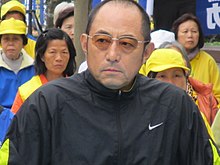Yuan Hongbing
Yuan Hongbing ( Chinese 袁紅 冰 / 袁红 冰 , Pinyin Yuán Hóngbīng , * 1953 in Hohhot , Inner Mongolia , People's Republic of China ) is a Chinese writer, lawyer and dissident.
Life
Yuan was born in Hohhot, Inner Mongolia, in 1953. He graduated from Peking University with a Masters degree in Criminal Law in 1986 and graduated from Peking University School of Criminal Law.
After the protests in Tian'anmen Square in 1989, Yuan came under official scrutiny for expressing his views. In 1990, Yuan published the book Winds on the Plain ( 荒原 風 , huāngyuán fēng ), which was widely used by university students . In the text, Yuan propagates what he calls the New Heroism ( 新 英雄 主义 , xīn yīngxióngzhǔyì ), which he associates with the belief in the Chinese race . Yuan rejects all individual attempts to gain freedom through political activity, flight or anything else as a betrayal of one's own race. He advocates totalitarianism in order to fuse the weak, ignorant and selfish individuals of a race into a strong whole.
Yuan Hongbing was also a labor rights activist. He took part in a so-called Peace Charter , which was formed on the model of Charter 77 . In 1994 he was detained and forced to leave Beijing. Yuan moved to Guizhou , where he became the dean of the Law Faculty at Guizhou Normal University . In 2004, Yuan traveled to Australia with his assistant Zhao Jing, where the two of them applied for asylum on July 28th. In June 2005 he supported the dissident Cheng Yonglin in a speech and accused the Chinese government of wanting to turn Australia into a political colony .
criticism
The sinologist Geremie R. Barmé described Yuan's ideas as Chinese fascism and compared them with Nietzsche's philosophy and the New Age movement. The following four publications of Yuan were rated as moderate.
Individual evidence
- ↑ Geremie R. Barmé, "To screw foreigners is patriotic: China's avant-garde nationalists" (1995) 34 The China Journal 209th
| personal data | |
|---|---|
| SURNAME | Yuan, Hongbing |
| BRIEF DESCRIPTION | Chinese writer, lawyer and dissident |
| DATE OF BIRTH | 1953 |
| PLACE OF BIRTH | Hohhot , Inner Mongolia, People's Republic of China |
